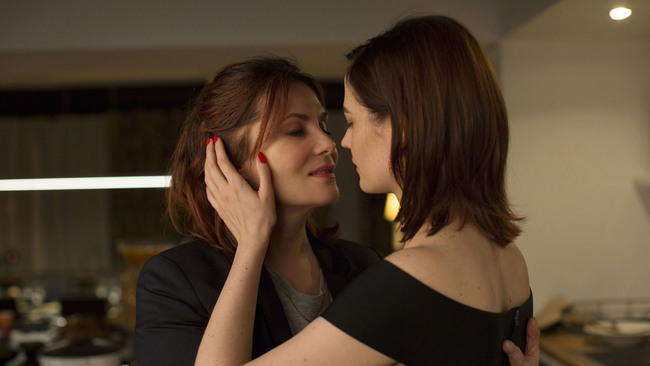Cannes 2017: Roman Polanski’s Based on a True Story

“When French writer Delphine le Vigan published her book Based on a True Story in 2015, some critics dubbed it ‘a Hitchcockian novel,’” begins Jonathan Romney, writing for Screen. “It’s not surprising, then, that Roman Polanski’s adaptation is very Hitchcockian indeed—but also supremely Polanskian. In fact, while the veteran director’s films can sometimes seem detached and impersonal, that detachment comes across here very much as his signature style, in a film which discreetly—and sometimes not so discreetly—echoes other of his works, including Repulsion, Death and the Maiden, and The Ghost Writer.”
Based on a True Story is “a fan-obsession suspense thriller, adapted by Polanski and Olivier Assayas,” writes the Guardian’s Peter Bradshaw. “There are touches of Single White Female and Stephen King’s Misery . . . This is a movie which begins with confidence and style, wearing its influences pretty insouciantly; the film sashays about the screen with a kind of sexy-chic smirk, like the unvarying facial expression of its co-lead Eva Green. But it wobbles at the brink of plot-holes which undermine the vital realistic plausibility of a film like this; the entire third act moreover loses its way and winds up, like its heroine, in a ditch.”
“Polanski surrogate Delphine (Emmanuelle Seigner) is enjoying great success with her new autobiographical novel but also burned out from the promo tour,” writes Sam C. Mac at the House Next Door. Elle (Eva Green) “is a supposed super-fan who ingratiates herself into Delphine’s life as a ‘good listener’ before gradually moving into the author’s flat and taking over her work, deleting slanderous Facebook posts, responding to emails, and even attending a face-to-face gig in her place. . . . A better film might commit itself to an antagonism of Delphine’s complacency and self-regard, but this one largely just registers as uncritical and defensive.”
“Assayas brings over his abiding interest of the persona swap motif, and the film is essentially a psychological war of attrition between the two women,” writes Little White Lies’ David Jenkins. “It’s rather a simple story and it deals explicitly with Big Themes, but it always seems to defy expectation and never fully descends into lurid pulp. It’s a film which does just enough to make you believe that what you’re watching is a real, human story, but with every scene, plants the seed of doubt as to whether Elle is some kind of psychic projection or the physical manifestation of a damaged mind.”
“Nothing in this feeble psychological thriller rings true for a moment,” finds the Telegraph’s Robbie Collin. “It’s not as if this is uncertain territory for the director, either: Polanski’s early career was characterized by this kind of tightly focused chamber meltdown. But compared to the likes of Repulsion (1965), Cul-de-sac (1966) and Rosemary’s Baby (1968), this feels like a badly ghostwritten counterfeit.”
All this “could be fascinating, if Polanski permitted himself to reveal so much as a fraction of the perversion we’ve come to expect from his movies,” writes Variety’s Peter Debruge, “but even with two capable leading ladies . . . the chemistry here hardly rises above room temperature.”
“It helps that the role of Elle seems tailor-made to cover the various shades of Eva Green’s usual range of personas, from puzzling charmer to evil seductress, dialing it all the way up to unhinged maniac when needed,” offers Tommaso Tocci at IndieWire. Even so, he gives the film a C+.
“A teasing, tongue-in-cheek tale of literary cannibalism, it's a film with in-jokes that will play best with audiences who watch France Culture programs and recognize references,” suggests Deborah Young in the Hollywood Reporter. “But there’s nothing so obscure it would prevent average French film fans from enjoying a few chills from the consummate 83-year-old director.”
Updates, 5/28: “Green, who combines an erotic shimmer with a great sense of comic timing, is the film’s saving grace,” argues Richard Porton at the Daily Beast. “She seems to be the only cast member aware of the material’s inherent ludicrousness . . . The problem is that this movie cannot inject new life into a tried and true formula. Rather surprisingly, Polanski and Assayas fail mightily to convince us why Delphine and Elle are drawn to each other in the first place. Their fateful literary kinship is merely parasitic on older, better movies.”
Barbara Scharres for RogerEbert.com: “The Polanski who conjures up fearsome threats to innocence in his films, who can make grim foreboding lurk under comedy and whimsy, and whose sexual themes are dark and uncompromising, appears to have gotten lost in the offbeat pop slickness of the Assayas world, more Irma Vep than Rosemary’s Baby, and more Personal Shopper in its treatment of transference and image-swapping. In Based on a True Story, it appears that Polanski is the ghost, and Assayas the ghost-director.”
For Nikola Grozdanovic, writing for the Playlist, “neither Pawel Edelman’s crystalline cinematography nor Alexander Desplat’s mischievous score can help the film from clumsily plummeting.”
Updates, 5/29: For Giovanni Marchini Camia, writing for the Film Stage, “the film feels like the work of an author thoroughly bored with his material, a sentiment impossible not to share as a viewer. . . . The most perverse aspect of Based on a True Story is its resolution: after two hours of insipid build-up, the film abruptly closes on a note so anticlimactic that it barely qualifies as an ending.”
Nicholas Bell at Ioncinema: “What could have been a subversive genre exercise on female authorship and agency becomes a tedious slog of repeated phrases (if we had to hear about Delphine’s ‘hidden novel’ just one more time…) and predictable patterns. To see Seigner in a similar vein, playing a pop star who is assailed by an obsessive fan (Isild Le Besco), a more worthwhile venture is Emmanuelle Bercot’s 2005 Back Stage.”
Cannes 2017 Index. For news and items of interest throughout the day, every day, follow @CriterionDaily.



